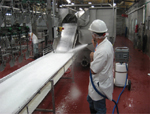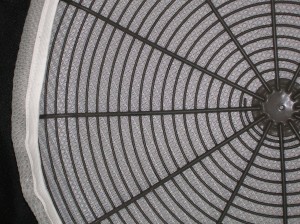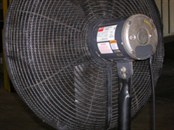 Breakfast may indeed be the most important meal of the day, particularly for major food processing plants located in the Midwest. While the economic downturn has slowed many industries product sales, cereal has maintained it’s position as a “value” food in the minds of most consumers. The demand for cereal as a thrifty food that can be eaten any time of the day has increased to over $10 billion dollars annually.
Breakfast may indeed be the most important meal of the day, particularly for major food processing plants located in the Midwest. While the economic downturn has slowed many industries product sales, cereal has maintained it’s position as a “value” food in the minds of most consumers. The demand for cereal as a thrifty food that can be eaten any time of the day has increased to over $10 billion dollars annually.
 Processing plants that produce cereal are subject to AIB (American Institute of Baking) inspection audits that mandate high standards of sanitation in food processing and handling establishments. Quality assurance that cross contamination is intercepted or eliminated is so vital to the food processing industry that steep penalties for violations are the norm. AIB Safety Audit & Inspection guidelines include Dust Collection & Filtering Devices be put in place to prevent possible contamination to food products from threads, lint and fibers. Common dust challenges found in food processing plants include raw agricultural products, like course grains ground into flour, which is then moved to mixing machines and combined with fine spices and other baking additives to create an atmosphere contaminated with sticky dust, egg shells and lint.
Processing plants that produce cereal are subject to AIB (American Institute of Baking) inspection audits that mandate high standards of sanitation in food processing and handling establishments. Quality assurance that cross contamination is intercepted or eliminated is so vital to the food processing industry that steep penalties for violations are the norm. AIB Safety Audit & Inspection guidelines include Dust Collection & Filtering Devices be put in place to prevent possible contamination to food products from threads, lint and fibers. Common dust challenges found in food processing plants include raw agricultural products, like course grains ground into flour, which is then moved to mixing machines and combined with fine spices and other baking additives to create an atmosphere contaminated with sticky dust, egg shells and lint.
Cooling Fan Recirculates Food Contamination
As an example, after dough is formed into cereal pieces or bars, it is baked in industrial strength ovens and conveyed to finishing areas and packaging stations. Fresh from the oven food items require high velocity air cooling from the fans blowing directly onto the product before it can be packaged. Unfortunately, as the necessary fans blow cool air, they also circulate unwanted particulates throughout the facility atmosphere and run the risk of cross contaminating food products as they’re being processed.  In this instance, facility staff found that the mobile and pedestal style air circulation fan components became covered in airborne contaminates as the equipment air intake drew in facility air, picked up the particles which then spread throughout the motor, blades and fan guards, and potentially be blown back out into the facility and onto finished food products. Maintenance had to take 25+ fans apart weekly, thoroughly cleaning all components, and then reassemble them. Dirt, water and cleaners found their way into the sensitive motors and electronics, causing the equipment to repeatedly burnout. At an average replacement cost of $300 per fan motor, not including downtime and labor, a solution needed to be found.
In this instance, facility staff found that the mobile and pedestal style air circulation fan components became covered in airborne contaminates as the equipment air intake drew in facility air, picked up the particles which then spread throughout the motor, blades and fan guards, and potentially be blown back out into the facility and onto finished food products. Maintenance had to take 25+ fans apart weekly, thoroughly cleaning all components, and then reassemble them. Dirt, water and cleaners found their way into the sensitive motors and electronics, causing the equipment to repeatedly burnout. At an average replacement cost of $300 per fan motor, not including downtime and labor, a solution needed to be found.
The initial labor intensive solution commonly used in many facilities was to cut a piece of disposable ½” nonwoven polyester with tackifier to the diameter of the fan, slit it for motor placement and place it onto the air intake, holding the filter in place using only the high velocity draw of air against the air intake. Unfortunately the media resistance to air flow (especially after the dirt collected on it) caused the motors to run too hot and burn out. Finished elastic edged nonwoven polyester fan shroud filters were also available, but cost prohibitive due to the frequency of throwing them away after use.
Fan Guard Fan Shroud Air Filter Solutions
 Midwest Air Filter, based out of Lansing Michigan, has been servicing the air filtration markets of Michigan and Northern Indiana industrial facilities since 1950. They were called in to find an efficient and cost effective air filtration solution. Recognizing that PreVent equipment protection bonnet style filter or fan shroud would enable the facility to pass the AIB audit, each air circulator fan was fitted with a filter. Custom sized to fit securely on the backside of each fan, the fan shroud filter wraps around the motor encasement and is held securely in place with an elastic edge and hook/loop attachment. The woven electrostatic polypropylene media attracts and holds the particles before they can enter the equipment, eliminating partic
Midwest Air Filter, based out of Lansing Michigan, has been servicing the air filtration markets of Michigan and Northern Indiana industrial facilities since 1950. They were called in to find an efficient and cost effective air filtration solution. Recognizing that PreVent equipment protection bonnet style filter or fan shroud would enable the facility to pass the AIB audit, each air circulator fan was fitted with a filter. Custom sized to fit securely on the backside of each fan, the fan shroud filter wraps around the motor encasement and is held securely in place with an elastic edge and hook/loop attachment. The woven electrostatic polypropylene media attracts and holds the particles before they can enter the equipment, eliminating partic le build-up and blow-off. The media’s low initial resistance to air flow of .02 versus non-woven polyester’s 0.11 in. w.g. keeps strain on the fan motor down, allowing it to run within OEM specs. Easily removed, the filters are changed out with a second set of fan shroud filters as needed, depending on their location within the facility (i.e., the powder generating flour bin location is daily versus finished product cooling conveyor area weekly), rinsed and reused. Both the equipment and the food product stay clean.
le build-up and blow-off. The media’s low initial resistance to air flow of .02 versus non-woven polyester’s 0.11 in. w.g. keeps strain on the fan motor down, allowing it to run within OEM specs. Easily removed, the filters are changed out with a second set of fan shroud filters as needed, depending on their location within the facility (i.e., the powder generating flour bin location is daily versus finished product cooling conveyor area weekly), rinsed and reused. Both the equipment and the food product stay clean.
Production companies continually look to conserve maintenance dollars by keeping a close eye on the costs of plant and equipment upkeep without sacrificing product quality and safety. Equipment air intake filters help ensure clean processing, maximum up time and smooth production flow critical to quality assurance and a profitable bottom line.

